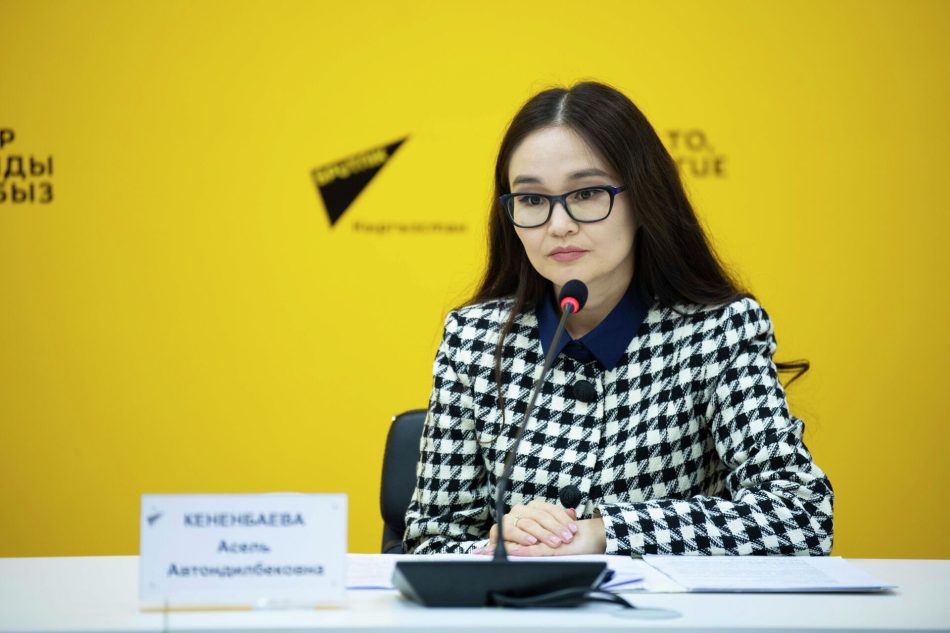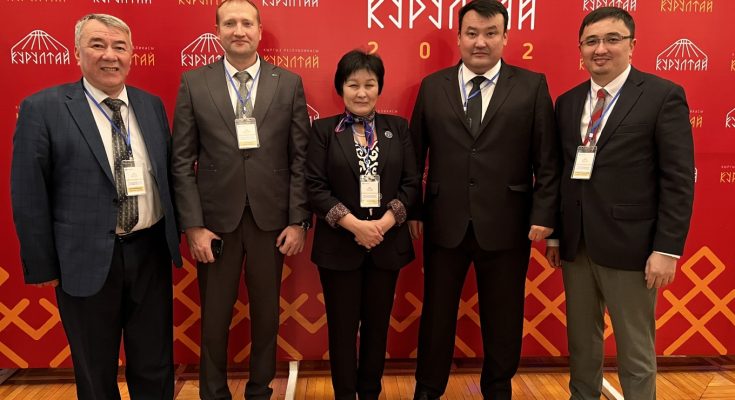<Indira Sharshenova (center). This photo highlights her position in the Ministry of Digital Development as a one-woman-at-a-table>
One day, as my little daughter sought solace in my arms during a thunderstorm, I couldn’t shake the thought of other children in my country whose mothers had been compelled to seek opportunities abroad, leaving them vulnerable to neglect and violence. This reality, coupled with the plight of young girls forced into early marriages due to limited options, compelled me to take action.
In Kyrgyzstan, stories of women facing violence and migrant children left behind by working mothers dominate the news, reflecting systemic injustices. As a civil servant, I felt a deep sense of responsibility to address these issues.
Utilizing my expertise in digital literacy, I embarked on a mission to empower women in Kyrgyz society. By showcasing the opportunities within the tech industry, I aimed to inspire confidence and resilience in women, enabling them to chart their own paths towards economic independence.
As a representative of the Ministry of Digital Development of the Kyrgyz Republic, I am deeply committed to advocating for gender equality and social justice. By amplifying the voices of women in the technical industry and championing their achievements, I aim to foster a more inclusive and equitable society where every individual has the opportunity to thrive. In doing so, I hope to honor the struggles of those who have been marginalized and disenfranchised, working towards a future where no woman or child is left behind.
In the landscape of technology, the voices of women are rising, breaking through barriers, and reshaping the narrative of what it means to thrive in the digital age. From the bustling streets of Chicago to the serene mountains of Kyrgyzstan, women are carving out their paths in the world of information technology (IT), defying odds, and inspiring generations to come.
Indira Sharshenova was one of the pioneering women in the Kyrgyz Republic who embarked on this journey when few knew about its potential. Starting her interest in STEM and math in 8th grade, back in 1994 when IT was still a nascent field, Indira faced formidable stereotypes that STEM was not for girls. Undeterred, she pursued math, eventually becoming involved in the automation processes of the government system and contributing to the establishment of the Digital Government. Her journey from Teaching Professor to Deputy Minister in the Ministry of Digital Development stands as a testament to her perseverance against stereotypes.

Asel Kenenbaeva, a young IT leader from Kyrgyzstan, rose from an IT specialist to Deputy Minister, defying the challenges of being a woman in a government agency. Driven by passion and belief in her projects, Asel’s career trajectory was marked by dedication and resilience. Her journey began in high school, inspired by pioneers like Bill Gates. Despite societal perceptions that IT was a male-dominated field, Asel pursued her passion, even in the face of skepticism from peers. Her transition from public policy to impactful state projects showcases the power of determination and self-belief.
In the heart of Chicago, Bermet Baitikova’s journey in the tech industry reflects resilience and determination. Despite encountering hurdles, she eventually found her footing in the tech world. Bermet’s story echoes the experiences of countless women worldwide who navigate male-dominated fields with courage and tenacity.
“Upon arriving in America, I explored various roles: service, salon administration, barista, nanny. I actively engaged in meetups, expanded my social circle, and that’s how I stumbled upon my interest in information technology,” Bermet shares. Moving to Chicago for a boot camp, she faced challenges but persisted, eventually securing a job with a $100K salary. Bermet’s advice to girls is simple yet powerful: “No matter how tough it gets, keep pushing forward, set goals, and be consistent in achieving them.”
These stories illustrate the diverse paths women take in the tech industry, breaking barriers and inspiring others along the way. From Bermet’s resilience to Sandu’s courage and Asel’s determination, each narrative underscores the importance of believing in oneself and seizing opportunities in pursuit of one’s dreams.

In Kyrgyzstan, a landlocked nation in Central Asia, a burgeoning tech scene is reshaping the country’s economic landscape. With initiatives aimed at fostering innovation and technological advancement, Kyrgyzstan is witnessing a surge in software development and digital entrepreneurship.
In recent years, Kyrgyzstan’s government has embarked on a bold initiative to propel the country into the digital age. By investing in coding programs and incentivizing tech companies, Kyrgyz leaders are laying the groundwork for a tech-savvy workforce and a thriving digital economy.
One such success story is Codify, a tech company founded by Dinara Ruslan, an expat who returned to Kyrgyzstan to share her expertise and empower the next generation of tech professionals. Through Codify and similar initiatives, women like Dinara are breaking barriers and paving the way for a more inclusive tech industry in Kyrgyzstan.
However, challenges persist. Despite the progress made, women in Kyrgyzstan continue to face barriers to entry in STEM fields. Socio-cultural norms and gender stereotypes often discourage girls from pursuing careers in technology, perpetuating a gender gap in the digital workforce.
Acknowledging the significance of gender equality in STEM, stakeholders in Kyrgyzstan are taking proactive measures to address systemic barriers and promote inclusivity. Initiatives like STEM4ALL, a platform supported by UNDP and UNICEF, aim to accelerate progress towards gender equality and increase the representation of women and girls in STEM fields. STEM4ALL serves as a virtual public forum for education, research, and news, promoting gender equality and inclusion in STEM in the region and beyond.
Closing the gender gap in STEM education and careers is crucial for achieving gender equality and developing infrastructure solutions and services that benefit people worldwide. Today’s world urgently requires scientific and technological solutions, necessitating the involvement of half of the world’s talent—women and girls.
TechWomen, an initiative of the U.S. Department of State’s Bureau of Educational and Cultural Affairs, works to advance the status of women and girls globally and promote development in STEM fields, enabling women to reach their full potential. The program partners with innovative companies in the San Francisco Bay Area and Chicago, Illinois, hosting emerging women leaders and providing them with unique opportunities for mentorship, professional growth, and cultural exchange.
These stories underscored the economic imperative of women’s participation in STEM, emphasizing the role of education and mentorship in empowering future generations of female technologists. Closing this article I can say about need for comprehensive reforms in the education system, early integration of STEM in curricula, and approaches to address societal attitudes and self-esteem issues among girls.
As Kyrgyzstan and countries around the world strive to harness the full potential of their digital economies, the empowerment of women in tech remains paramount. By breaking down barriers, challenging stereotypes, and fostering a supportive ecosystem, we can create a future where women thrive in STEM fields, driving innovation, and shaping the world for the better.
All women’s journey mirrors the resilience and determination of women everywhere who dare to defy expectations and pursue their passions. From Kyrgyzstan’s tech revolution to global initiatives like STEM4All, the momentum is building towards a more inclusive and equitable future in technology—one where women’s voices are heard, valued, and celebrated.




